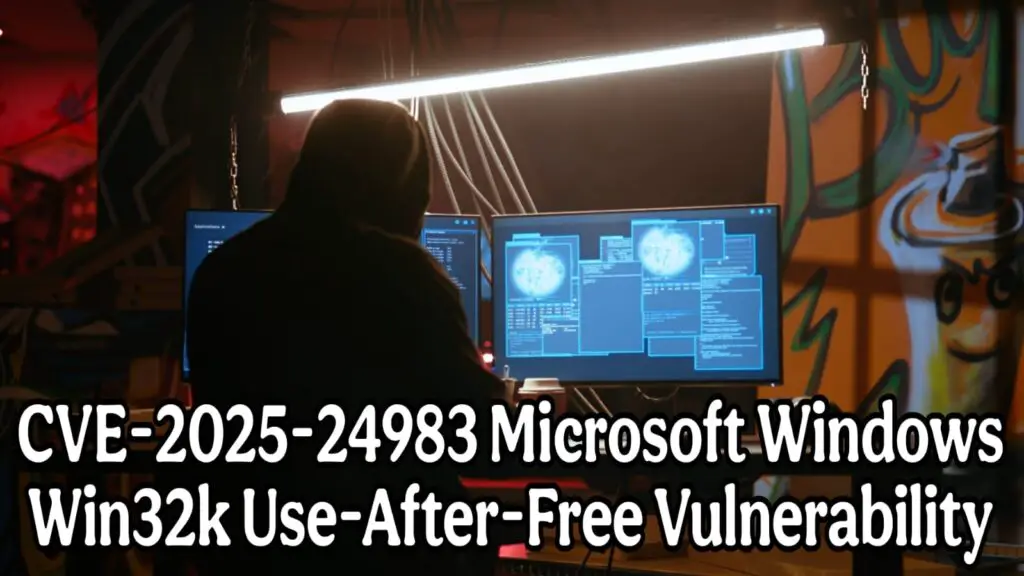[Solved] CVE-2025-24983 Microsoft Windows Win32k Use-After-Free Vulnerability

Microsoft just dropped a critical security update, and if you’re not paying attention, you’re leaving your systems wide open. CVE-2025-24983 is a use-after-free vulnerability in the Win32 Kernel Subsystem, and it’s already being exploited in the wild. Hackers are using it to gain SYSTEM privileges, which means once they’re in, they can do whatever they want—steal data, disable security measures, install malware, and more.
If you’re running Windows 10, Windows 11, or Windows Server (2016, 2019, 2022, and 2025), you are at risk. Microsoft has released security updates, but let’s be real—many organizations are slow to patch. That hesitation? It’s an open door for attackers.
What Makes CVE-2025-24983 So Dangerous?
This isn’t just some theoretical flaw. This vulnerability is already being exploited. Attackers are using a well-known exploit chain—leveraging PipeMagic malware—to compromise systems.
A use-after-free bug occurs when a program continues to use memory that has already been freed, causing unpredictable behavior. In this case, it allows attackers to escalate privileges from a standard user to SYSTEM-level access, the highest level of control in Windows. That means they can:
- Bypass security controls
- Install malware without detection
- Disable security software
- Steal sensitive information
- Take full control of the machine
With a CVSS score of 7.0 (High), this is not something to ignore. It’s time to patch NOW.
Which Windows Versions Are Affected?
The attack surface for this vulnerability is massive. If you’re running any of these versions of Windows, you’re vulnerable:
Windows Client OS
- Windows 11 Version 24H2 → KB5053598
- Windows 11 Versions 23H2, 22H2 → KB5053602
- Windows 10 Version 22H2 → KB5053606
- Windows 10 Version 1607 (x64 & 32-bit) → KB5053594
- Windows 10 (x64 & 32-bit) → KB5053618
Windows Server OS
- Windows Server 2025 → KB5053598
- Windows Server 2022 → KB5053603
- Windows Server 2019 → KB5053596
- Windows Server 2016 (including Server Core) → KB5053594
- Windows Server 2012 R2 (including Server Core) → KB5053887
- Windows Server 2012 (including Server Core) → KB5053886
- Windows Server 2008 R2 SP1 (including Server Core) → KB5053620, KB5053627
- Windows Server 2008 SP2 (x64 & 32-bit, including Server Core) → KB5053888, KB5053995
How to Fix CVE-2025-24983 (Before Hackers Exploit It Further)
The only way to fully mitigate this vulnerability is to apply the security patches immediately. Here’s how:
For Individual Users:
Go to Windows Update → Settings > Update & Security > Windows Update
Click Check for Updates
Download and install the latest patch (based on your OS version above)
Restart your machine
For IT Admins & Enterprises:
Use Tanium or SCCM to deploy the relevant KB update
Manually download the update from the Microsoft Update Catalog
Test updates on a subset of machines before company-wide deployment
Monitor logs for exploitation attempts (look for unusual privilege escalations)
Why You Need to Patch Now
Cybercriminals are constantly looking for easy entry points, and unpatched vulnerabilities like CVE-2025-24983 are a goldmine. Once an attacker has SYSTEM access, it’s game over—your data, infrastructure, and security controls are all compromised.
This vulnerability is actively being exploited—you don’t have the luxury of waiting. If your organization is slow to patch, it’s only a matter of time before you become a victim.
Final Thoughts
CVE-2025-24983 is not just another patch Tuesday fix—this is a serious, actively exploited vulnerability that demands immediate action. If you’re running Windows 10, Windows 11, or any affected Windows Server version, install the relevant KB update right now. Don’t wait for an attack to force your hand.
Patch. Secure. Stay ahead of the threats.
Related posts:
- How to Download offline setup of Microsoft Store App
- Mitigate WinVerifyTrust Signature Validation Vulnerability CVE-2013-3900
- Zero Trust Security – Fortifying Your Digital Kingdom in the Modern Age
- [Solved] How to solve Windows update error 0x800f0831- CBS E_STORE_CORRUPTION
- [Solved] CVE-2024-35250-Windows Kernel-Mode Driver Elevation of Privilege Vulnerability
- BeyondTrust Privileged Remote Access and Remote Support products Vulnerability (CVE-2024-12356 & CVE-2024-12686
- NIST CSF 2.0 and Penetration Testing: All You Need to Know
- Chained for Attack: OpenVPN Vulnerabilities Leading to RCE and LPE
- March 2025 Patch Tuesday: A Stabilizing Security Landscape
- CVE-2025-24991: Unmasking the Windows NTFS Out-Of-Bounds Read Vulnerability
